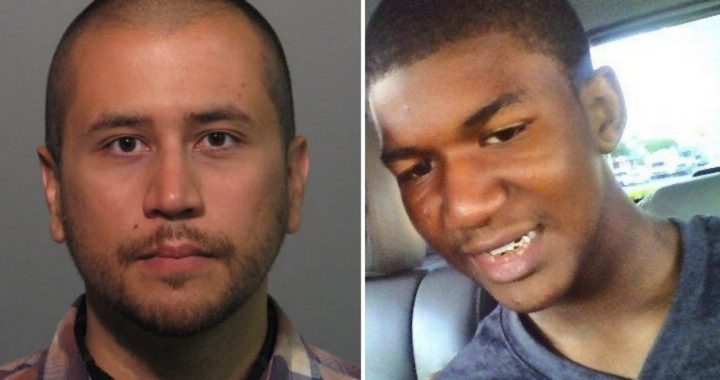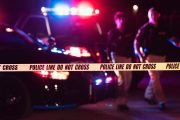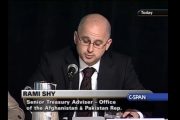
One year after the confrontation between black teenager Trayvon Martin (shown right) and a Hispanic neighborhood watch volunteer, George Zimmerman (left), resulted in the shooting death of Martin and subsequent international attention, the town of Sanford, Florida, remembered the incident with a small memorial service. Many, however, are holding their collective breaths waiting for the second shoe to drop. That will happen in April when a hearing will take place on whether Zimmerman’s plea under Florida’s Stand Your Ground law will be upheld. If it isn’t, then his jury trial on charges of second-degree murder is scheduled to begin in June.
On Sunday evening, February 26, 2012, Zimmerman observed Martin behaving suspiciously in his gated community and called the police. After the call Zimmerman left his vehicle to check his exact location to assist the officers in finding him. Zimmerman said that Martin “came out of nowhere,” issuing epithets and obscenities, and proceeded to beat him up, breaking his nose, knocking him to the ground and threatening to kill him. Zimmerman called for help, and when none arrived, he took his 9mm Kel-Tec PF9 pistol and fired one shot at Martin at close range. The round entered Martin’s chest and killed him almost instantly.
After five hours of questioning, Zimmerman was released, the police saying they had no evidence that contradicted Zimmerman’s claim of self-defense.
On March 12, one of the two officers who had interrogated Zimmerman sent a “capias request” — essentially a request to issue an arrest warrant — to the Florida state attorney recommending that Zimmerman be charged with manslaughter:
The encounter between George Zimmerman and Trayvon Martin was ultimately avoidable by Zimmerman, if Zimmerman had remained in his vehicle and waited [for] the arrival of law enforcement or conversely if he had identified himself to Martin as a concerned citizen and initiated dialogue in an effort to dispel each party’s concern.
Although the request was denied, a special prosecutor was appointed on March 22 to continue the investigation into the incident and on April 11 filed a charge of second-degree murder against Zimmerman. According to the affidavit,
Martin … walked back to and entered the gated community and was on his way back to the townhouse where he was living when he was profiled by George Zimmerman. Martin was unarmed and was not committing a crime.
Zimmerman who also lived in the gated community, and was driving his vehicle, observed Martin and assumed Martin was a criminal….
Zimmerman … called the police [and] spoke to the dispatcher and asked for an officer to respond because Zimmerman perceived that Martin was acting suspicious[ly]. The police dispatcher informed Zimmerman that an officer was on the way and to wait for the officer….
Zimmerman disregarded the police dispatcher and continued to follow Martin who was trying to return to his home….
The facts mentioned in his Affidavit are not a complete recitation of all the pertinent facts and evidence in this case but only are presented for a determination of Probable Cause for Second Degree Murder.
Zimmerman raised sufficient funds to meet the demands of his $1 million bail, and has remained incognito somewhere in Florida while wearing a tracking device for Florida authorities.
On June 21, Zimmerman was interviewed by Sean Hannity on Fox News, going public for the first time (on the advice of counsel) since the shooting and giving his side of what happened that night.
There are two bridges Zimmerman must cross before this incident disappears into history: the April hearing and the June trial.
The first hearing, to take place in April, is on his claimed self-defense under Florida’s stand-your-ground law. Legal experts are divided as to whether Zimmerman will prevail. According to Richard Hornsby, an Orlando-based criminal defense attorney, Zimmerman is likely to be indicted by the grand jury for manslaughter, a second-degree felony punishable by up to 15 years in prison. He said:
This case isn’t even a close call for me. This is a case of a guy trying to be a vigilante. It wasn’t like he was trying to avoid trouble. He brought a firearm to a fistfight.
If Zimmerman is indicted, he could raise the stand-your-ground defense, which under Florida law provides that
a person who is not engaged in an unlawful activity and who is attacked in any other place where he or she has a right to be has no duty to retreat and has the right to stand his or her ground and meet force with force, including deadly force if he or she reasonably believes it is necessary to do so to prevent death or great bodily harm to himself or herself or another or to prevent the commission of a forcible felony.
Assuming that Zimmerman’s plea is declined, the jury trial begins in June. In the meantime, Zimmerman has sought funds for his defense which, as of January 2, total more than $314,000. His bond cost $95,000, his living expenses are $61,000 and climbing, and his attorneys have cost $76,000 so far. Those knowledgeable about the case estimate the total could exceed a million dollars.
Zimmerman might recoup some of that, however, in the event his lawsuit against NBC succeeds. He is suing NBC over its efforts to sensationalize the case by modifying his dialogue between himself and the 911 dispatcher to make it appear that Zimmerman was racially motivated in his confrontation with Martin.
One interesting twist is the statement by Zimmerman’s attorneys about his possible use of stand-your-ground law. They wrote on their website:
In this particular case, George did not have an ability to retreat because he was on the ground with Trayvon Martin mounting him, striking blows, therefore the Stand Your Ground “benefit” given by the statute simply does not apply to the facts of George’s case: it is traditional self-defense.
No matter what happens in April, many questions will remain. It may take a long, highly publicized jury trial that will likely draw international attention once again before the matter is finally settled. In the meantime, Martin, who would have turned 18 on February 5, is dead, and Zimmerman is lying low somewhere in Florida, holding his breath.
A graduate of Cornell University and a former investment advisor, Bob is a regular contributor to The New American and blogs frequently at www.LightFromTheRight.com, primarily on economics and politics. He can be reached at [email protected].



